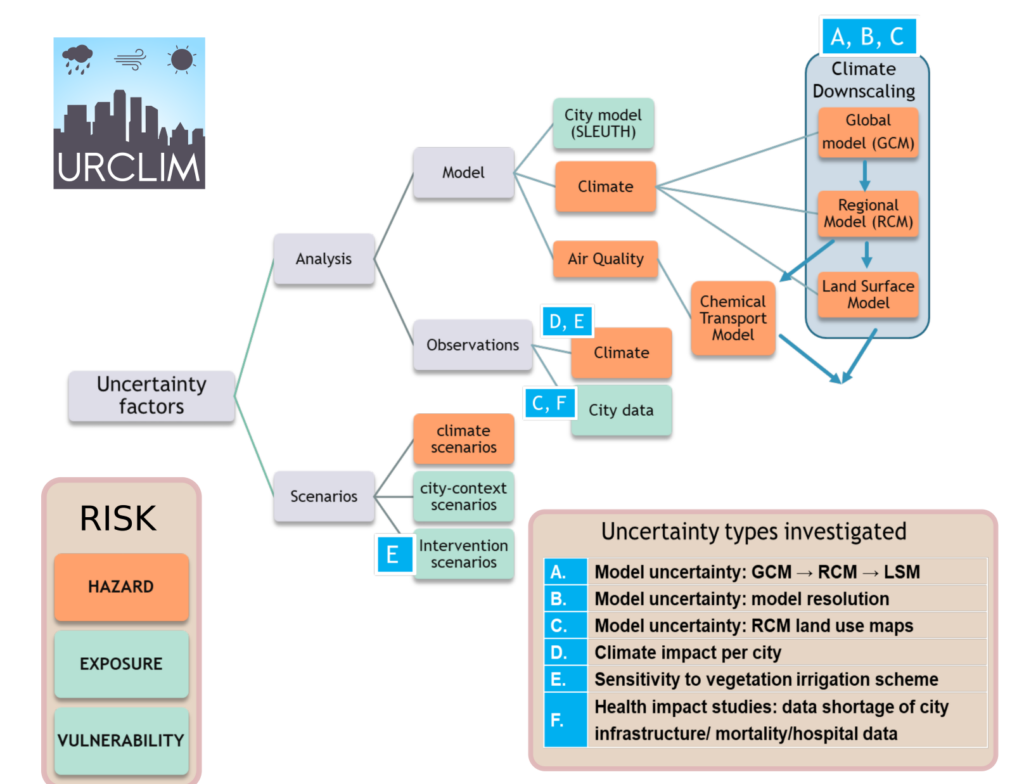In many cities across Europe, both urban authorities and private actors have made strong commitments to adapt to future climate changes. Although a lot of climate information is available at the global and regional scale, this is often not the case at the local urban scale. Moreover, such information should account for a wide range of uncertainty factors ranging from global to city-scale development scenarios to uncertainties due to model errors. In an effort to lay the methodological groundworks for reliable urban climate services, URCLIM explores a compound handling of these uncertainties for various European cities and applies it to the assessment of adaptation measures.
BERT VAN SCHAEYBROECK1, BÉNÉDICTE BUCHER3, ZENAIDA CHITU2, SIDONIE CHRISTOPHE3, CARL FORTELIUS4, RAFIQ HAMDI1, VALÉRY MASSON5, ADRIAAN PERRELS4, BEN WICHERS SCHREUR6
1Royal Meteorological Institute of Belgium (RMI), Belgium
2Meteo Romania, Romania
3Univ Gustave Eiffel, LASTIG, IGN, ENSG, France
4Finnish Meteorological Institute, Finland
5Météo France, France
6Koninklijk Nederlands Meteorologisch Instituut, Netherlands
The URCLIM project and the uncertainty issue – Climate change will be strongly felt in cities through increased health and socio-economic risks. This originates from the strong urban exposure due to high density in population, infrastructure and emissions, but also from increased risks due to more extreme weather conditions. Moreover, the urban heat island effect (UHI; Oke et al., 2017) leads to temperatures that are typically higher within the city than in the surrounding rural areas. Especially during heat waves, the absence of night-time cooling poses a threat to the most vulnerable in the population. Following the Paris Agreement, cities worldwide committed to introduce sustainable climate-resilient solutions, for instance through the Covenant of Mayors. In order for these cities to develop well-informed plans for climate action, reliable information is required (Bader et al., 2018). Such information necessitates an accurate evaluation of uncertainties owing to the uncertain pace of global warming, uncertainty in urban development, and shortfalls in the impact evaluation tools for local scales. By combining the expertise in urban climate, geomatics, urban mapping, socio-economics and health impacts, URCLIM aims to realize a proof of concept for integrated Urban Climate Services (UCS) for the metropolitan areas of Helsinki, Toulouse, Brussels, Amsterdam, and Bucharest obtained through a close collaboration with city authorities.
URCLIM objectives & purposes – The objective of developing UCS at the scale pertinent for urban planners is currently being established through 1) the production of high-resolution urban maps for incorporation in urban climate models, obtained using a generic processing chain that is easily generalizable to other cities, (https://github.com/orbisgis/geoclimate), 2) development of methodological best practices for urban impacts (see next paragraph), 3) assess the separate and combined impact of adaptation strategies and climate-change and city-development scenarios, and, 4) co-creation of innovative 3D visualization and data interaction tools.
Methods & uncertainty exploration – URCLIM aims to distil UCS information from raw data taken from state-of-the-art climate projections and observational datasets. To estimate uncertainties, it is necessary to take a close look at the data-generation process. Indeed, depending on the impact different steps are required, each of which is associated with uncertainty factors. URLIM has considered these uncertainties in detail for UHI, floods, air quality, human comfort and socio-economic impacts as for instance shown in Fig. 1. One can distinguish the uncertainties that the scientists aim to minimize (observational, model or analysis uncertainties) from those associated with the unknown future including scenarios for greenhouse gases as well as city-context scenarios or intervention scenarios. Each step can also be categorized by one of the components of risk: hazards (orange colour in Fig. 1), exposure or vulnerability (green). A major URCLIM achievement is the development of a methodology for uncertainty propagation from the global to the urban scale. More specifically, a computationally-cheap method for producing decades-long physically-coherent climate simulations, obtained by downscaling the CORDEX ensemble of regional climate model projections down to kilometre resolution.

Prospects & Follow-up – URCLIM provides a proof-of-concept for science-based Urban Climate Services for a few cities with a strong focus on generalizability and aimed at the most prominent urban impacts. Generalizability is ensured by means of open-source and open-access tools to generate high-resolution urban maps, the use of freely available CORDEX data and smart visualization tools, in close collaboration with city actors.
Acknowledgements: This work received funding from EU’s H2020 Research and Innovation Program under Grant Agreement number 690462.
References
Oke, T., et al., 2017: Urban Climates. Cambridge, Cambridge University Press, DOI: https://doi.org/10.1017/9781139016476
Bader, D. A., et al., 2018: “Urban Climate Science,” in Climate Change and Cities, eds. C. Rosenzweig, P. Romero-Lankao, S. Mehrotra, S. Dhakal, S. Ali Ibrahim, and W. D. Solecki (Cambridge: Cambridge University Press), 27–60.
HOW TO CITE THIS ARTICLE:
Van Schaeybroeck B., Bucher B., Chitu Z., Christophe S., Fortelius C., Hamdi R., Masson V., Perrels A., and Wichers Schreur B., 2020: Urban climate services: climate impact projections and their uncertainties at city scale, FMI’s Climate Bulletin: Research Letters, 2(1), 12–13, DOI: https://doi.org/10.35614/ISSN-2341-6408-IK-2020-05-RL
CITATION INFORMATION:
Authors: Bert Van Schaeybroeck, Bénédicte Bucher, Zenaida Chitu, Sidonie Christophe, Carl Fortelius, Rafiq Hamdi, Valéry Masson, Adriaan Perrels, and Ben Wichers Schreur
Received: March 2, 2020
Accepted: May 11, 2020
First online: May 19, 2020
Published: May 25, 2020
Journal: FMI’s Climate Bulletin: Research Letters
Volume: 2
Issue: 1
Pages: 12–13
DOI: https://doi.org/10.35614/ISSN-2341-6408-IK-2020-05-RL
This article is part of the ERA4CS Special Issue.
Header image: Pasi Markkanen




